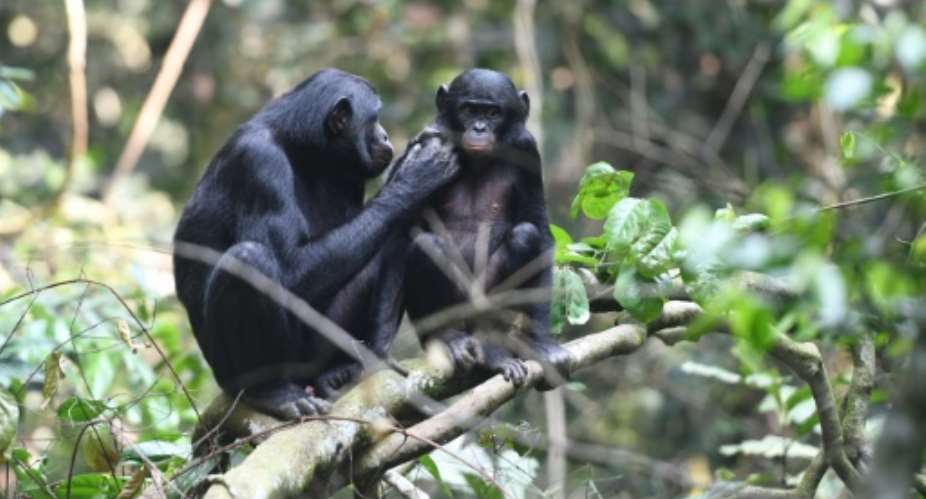Bonobos, our altruistic, peaceful and lascivious primate relatives are known for their female-dominant societies, in contrast to more violent and patriarchal chimpanzees.
What we didn't know, until now, was the outsized role bonobo mothers play in ensuring their sons have fruitful sex lives: from using their rank to ensure their male offspring get to meet attractive ovulating females, to interfering with male rivals' attempts to mate.
The behavior was described in a study published Monday in the journal Current Biology, which found that bonobo males who had a mother living in their group were three times more likely to sire offspring than those without.
"This is the first time that we can show the impact of the mother's presence on a very important male fitness trait, which is their fertility," Martin Surbeck, a primatologist at the Max Planck Institute for Evolutionary Anthropology, said in a statement.
"We were surprised to see that the mothers have such a strong, direct influence on the number of grandchildren they get."
For the study, Surbeck and colleagues observed wild bonobo populations in the Democratic Republic of Congo, as well as wild populations of chimpanzees in Ivory Coast, Tanzania, and Uganda.
They found that both bonobo and chimpanzee mothers attempted to assist their sons, but bonobos were far more successful because their communities' highest ranks are dominated by females.
Chimpanzee communities on the other hand are dominated by males who compete for alpha status.
"The bonobo moms act a bit like social passports," Surbeck told AFP. "The sons, in close proximity to their moms, are also very central in the group and access positions in the group that allow them to interact more with other females including copulation."
"If there's a female who's very attractive, you see moms stick around them, and in the shadow of their moms are the males," he added.
By contrast, they found that if a mother lost her high rank, her son also fell in rank and was subsequently less successful in his mating attempts.
Intriguingly, bonobo mothers did not go the extra mile for their daughters, nor did they help their daughters raise offspring.
Surbeck's current hypothesis is that, since bonobo daughters leave the community and males remain behind, it may not be worth the mothers' time from an evolutionary perspective.
One thing the team believes they now have evidence for is the so-called "grandmother hypothesis": that a post-reproductive female can continue her genes by ensuring her offspring's reproductive success.
It is an idea that anthropologists have applied to humans and Surbeck believes it could also be the case for bonobo populations.
"The interesting thing now is in bonobos we have such a mechanism, apparently allowing the females to do that, but intriguingly not through their daughters but their sons," he told AFP.





 Whoever participated in the plunder of the state must be held accountable – Jane...
Whoever participated in the plunder of the state must be held accountable – Jane...
 A vote for John and Jane is a vote to pull Ghana from the precipice of destructi...
A vote for John and Jane is a vote to pull Ghana from the precipice of destructi...
 I’ll repay your abiding confidence with loyalty, understanding and a devotion to...
I’ll repay your abiding confidence with loyalty, understanding and a devotion to...
 ‘I’ve learnt deeply useful lessons for the future' — Serwaa Amihere breaks silen...
‘I’ve learnt deeply useful lessons for the future' — Serwaa Amihere breaks silen...
 I’m sorry for the embarrassment – Serwaa Amihere apologises for leaked sex video
I’m sorry for the embarrassment – Serwaa Amihere apologises for leaked sex video
 Dumsor: Matthew Opoku Prempeh not in charge of Energy sector – Minority
Dumsor: Matthew Opoku Prempeh not in charge of Energy sector – Minority
 Adu Boahen’s murder: Police arrest house help who was in possession of deceased’...
Adu Boahen’s murder: Police arrest house help who was in possession of deceased’...
 Akufo-Addo nominates Felicia Attipoe as Tema West MCE
Akufo-Addo nominates Felicia Attipoe as Tema West MCE
 Election 2024: I can't have someone I defeated twice as my successor – Akufo-Add...
Election 2024: I can't have someone I defeated twice as my successor – Akufo-Add...
